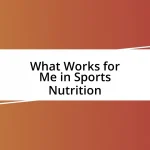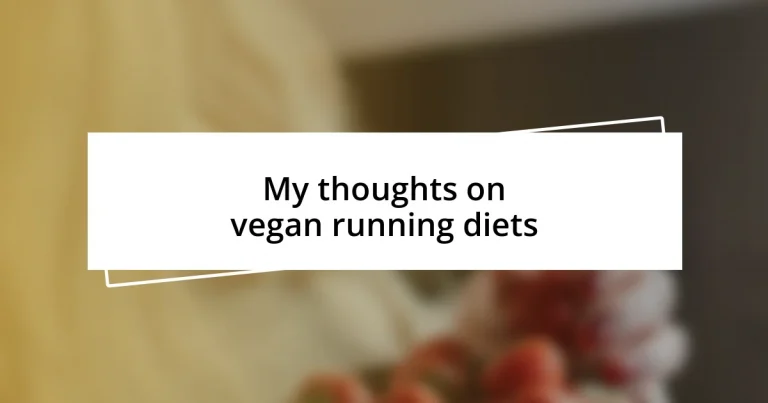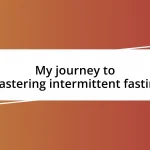Key takeaways:
- Adopting a vegan running diet requires careful meal planning to ensure balanced macronutrients and hydration for optimal performance and recovery.
- Essential nutrients for vegan runners include iron, protein, and omega-3 fatty acids, which can be sourced from various plant-based foods.
- Common misconceptions include the belief that vegan diets lack protein, are restrictive, and can’t support athletic performance; with proper planning, these myths can be debunked.
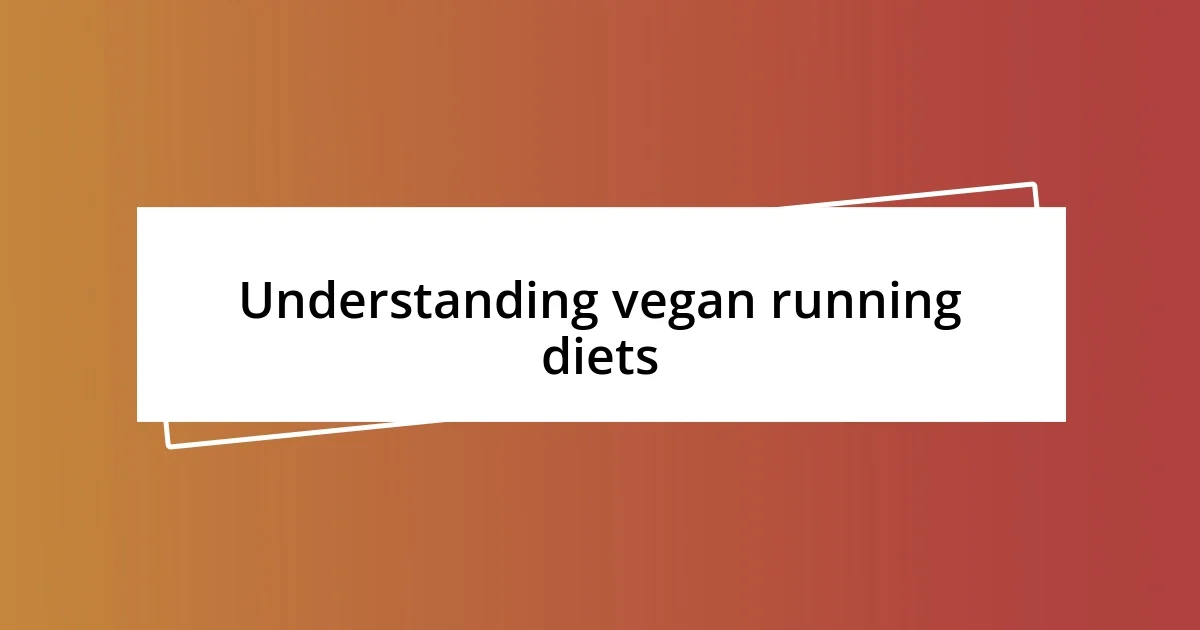
Understanding vegan running diets
Understanding vegan running diets requires a keen awareness of both nutrition and the specific needs of runners. I remember when I first transitioned to a vegan diet while training for a marathon; the initial struggle was real. I found myself wondering, “Can I really get enough energy from plant-based foods?” It turns out, with a bit of planning and creativity, the answer is a resounding yes!
When pursuing a vegan running diet, it’s essential to focus on whole foods that provide balanced macronutrients. For instance, I discovered that incorporating ample amounts of lentils, quinoa, and a variety of fruits and vegetables helped fuel my runs while also supporting recovery. It struck me that understanding food combinations—for instance, pairing rice with beans—creates complete proteins, ensuring my body gets what it needs without animal products.
Moreover, hydration is pivotal in vegan diets, as plant-based foods often have higher water content. I learned that being mindful of hydration can significantly impact my performance. Have you ever felt sluggish mid-run? That’s often a sign of dehydration or insufficient nutrients. By integrating smoothies packed with greens and berries into my regimen, I not only enhanced my stamina but also enjoyed the delicious flavors while staying energized.
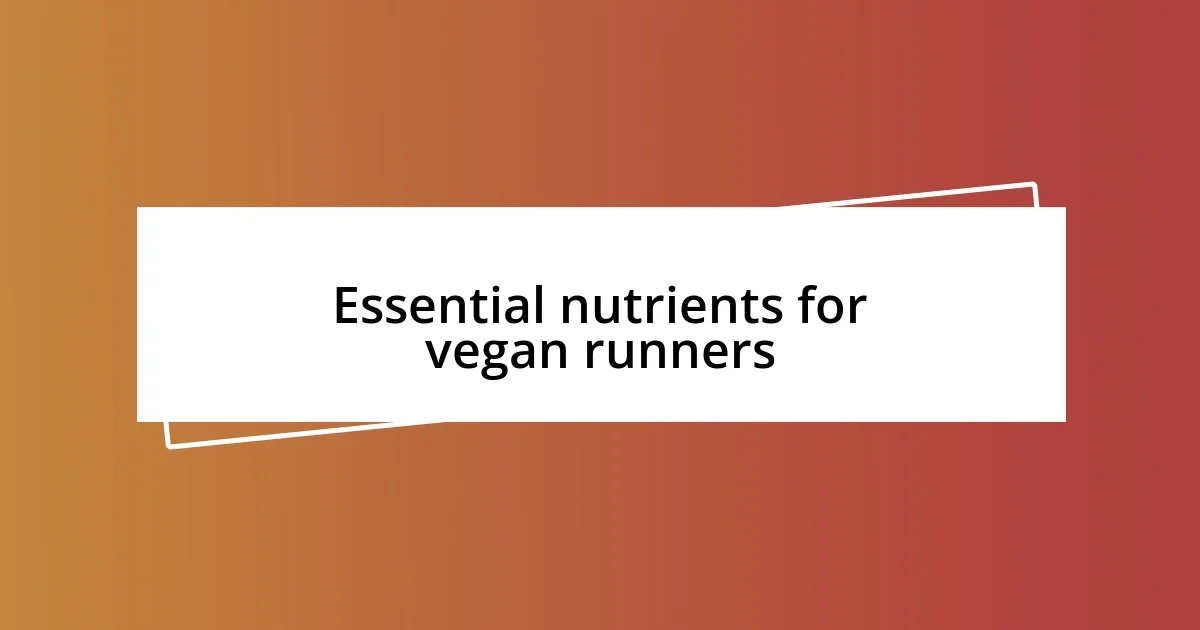
Essential nutrients for vegan runners
Vegan runners need to pay close attention to certain essential nutrients to ensure they are meeting their energy and recovery needs. Iron, for example, is crucial for transporting oxygen in the body. I remember feeling unusually fatigued during a training cycle, and it turned out my iron levels were low. Incorporating foods like spinach, chickpeas, and fortified cereals helped me bounce back.
Protein is another key nutrient that often raises questions among those adopting a vegan diet. I found myself experimenting with sources like tempeh, edamame, and a variety of beans to ensure I reached my protein goals. Combining these plant-based sources effectively made my meals satisfying and nutritious.
Lastly, omega-3 fatty acids should not be overlooked, as they play a vital role in reducing inflammation and supporting heart health. I took to adding chia seeds and ground flaxseeds to my smoothies, which not only enhanced the texture but also ensured I was fueling my body properly. Remember, a well-planned vegan diet can be incredibly effective for runners, but it always pays to pay attention to these critical nutrients.
| Nutrient | Sources |
|---|---|
| Iron | Spinach, lentils, quinoa |
| Protein | Tempeh, beans, edamame |
| Omega-3 fatty acids | Chia seeds, flaxseeds, walnuts |
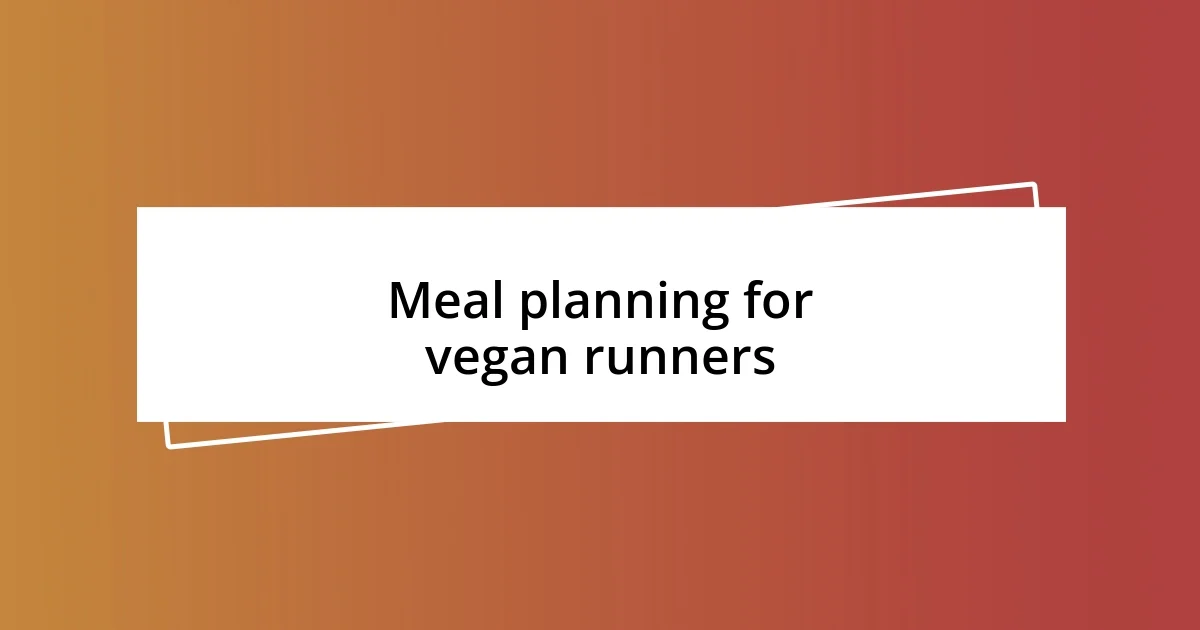
Meal planning for vegan runners
When it comes to meal planning for vegan runners, the goal is to create balanced meals that support performance and recovery. I remember one particular week of training when I decided to try batch cooking on Sundays. This simple decision transformed my weekdays—having meals ready to go meant I didn’t grab random snacks that didn’t support my goals. Instead, I found myself reaching for nourishing bowls full of roasted veggies, chickpeas, and brown rice, fueling my runs throughout the week.
Here are some tips to help you effectively plan your meals:
- Choose Energy-Dense Foods: Foods like nut butters, avocados, and whole grains will provide sustained energy for your runs.
- Prep Ahead: Spend a bit of time on weekends preparing meals or snacks, such as energy balls or overnight oats, that are easy to grab on busy days.
- Diversify Your Plate: Aim for a rainbow of fruits and vegetables to ensure you’re getting a variety of nutrients—colorful plates aren’t just visually appealing; they’re nutrient-rich too!
- Incorporate Easy Post-Run Snacks: Keep items like hummus and veggies or protein smoothies on hand for quick recovery options.
- Listen to Your Body: Track how different foods make you feel during and after your runs to help fine-tune your meal plans to what works best for you.
I often reflect on how meal planning changed my approach to running. Instead of worrying longingly about the energy I might be losing on my long runs, I began to embrace the planning process as part of my routine. It became an integral part of my journey, allowing me to confidently tackle even the toughest training sessions.
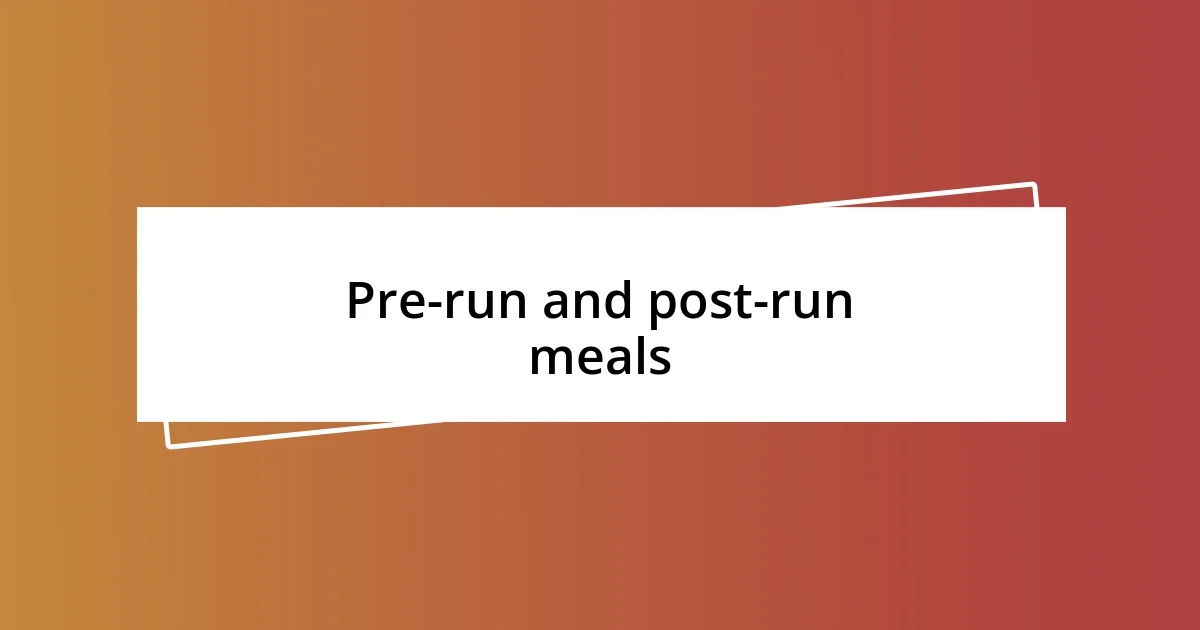
Pre-run and post-run meals
When I think about pre-run meals, I often remember my first 10k race. I was nervous and didn’t want to overeat, so I stuck with a banana and a scoop of almond butter. It turned out to be the perfect snack! It gave me just enough fuel without weighing me down. I generally recommend foods that are rich in carbohydrates and a bit of protein, like oatmeal with fruit or a slice of whole grain toast with avocado. These combinations can help energize your run while also ensuring you’re not running on an empty stomach.
After those long runs, I’ve found that the right post-run meals can really make a difference in how I feel. I typically whip up a smoothie loaded with spinach, a banana, and some protein powder; it’s a quick and easy way to replenish lost nutrients. One memorable experience was downing a hearty chickpea salad right after a particularly grueling workout. The taste and texture were so satisfying that it felt like a well-deserved reward rather than just a meal! It’s essential to pair carbs with protein for recovery, so think about having something like a quinoa bowl mixed with roasted vegetables and tofu.
I can’t stress enough the need to listen to your body when choosing these meals. Have you ever noticed how certain foods affect your energy during runs? For me, dairy can sometimes leave me feeling sluggish, so I’ve swapped it out for non-dairy alternatives. I encourage you to experiment with different combinations and see what truly makes you feel great both pre- and post-run. Remember, what works for one person may not work for another, and that’s perfectly okay!
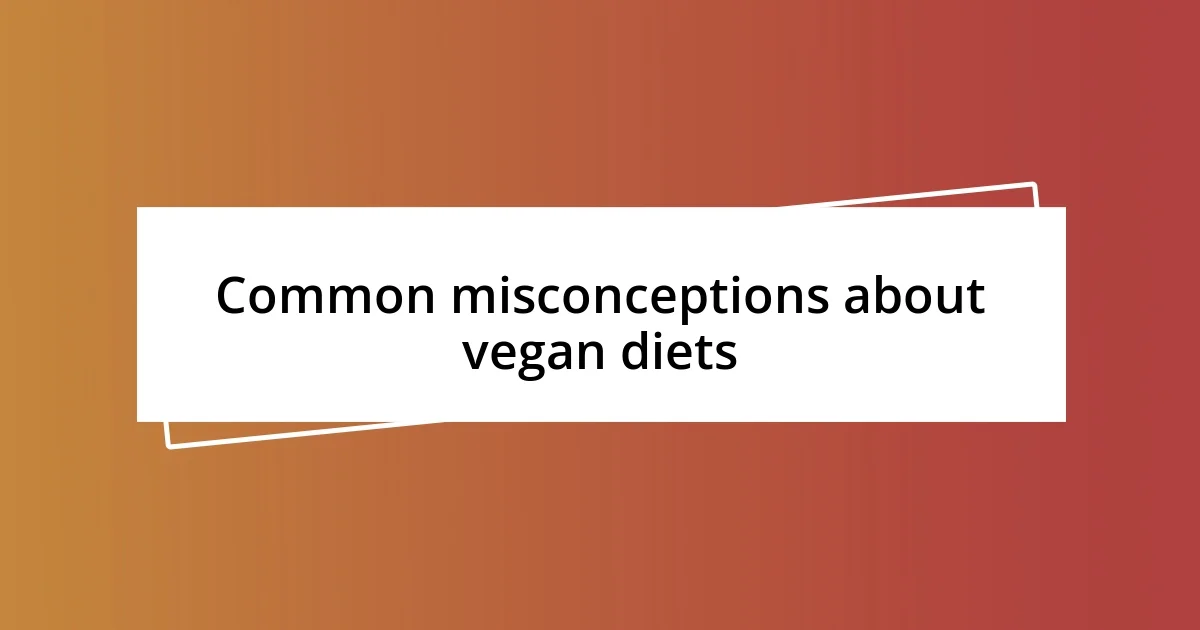
Common misconceptions about vegan diets
One common misconception about vegan diets is that they lack sufficient protein. I remember when I first transitioned to a plant-based diet; I felt the pressure to prove that I could meet my protein needs without animal products. It’s interesting to discover that foods like lentils, quinoa, and chickpeas are not only protein-rich but also provide essential amino acids. Why do we often underestimate the power of plants?
Another myth is that vegan diets are overly restrictive and boring. I used to dread the idea of limiting my meal options, but I quickly learned that a vegan diet opens up a world of diverse flavors and dishes. Experimenting with cuisines from various cultures has led me to some delightful finds, like spicy jackfruit tacos and creamy cashew-based Alfredo pasta. When I think back to those early days, it amazes me how a little creativity in the kitchen can transform any meal into an adventure.
Lastly, many believe that vegan diets can’t support intense athletic performance. I felt this doubt, especially during training for my first marathon. Yet, after a few months, I realized my energy levels and recovery were thriving. Incorporating energy-dense foods and proper meal timing made the difference. Have you ever felt like your diet limits your potential? I certainly did, but embracing a vegan diet turned out to be one of my best decisions as an athlete.


